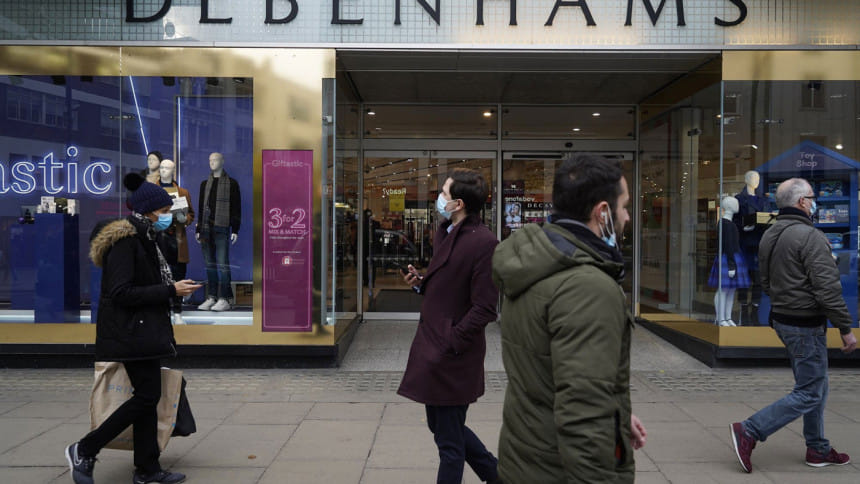Western dealmakers shouldn’t forget about Bangladeshi apparel suppliers

Who is thinking of the manufacturers? Who is considering the garment workers? These were the two questions that went through my head when I read news recently that online fashion retailer Boohoo had purchased the Debenhams brand for 55 million pounds, while Asos had signed a deal to buy the brands of Arcadia, including Top Man and Top Shop, for 295 million pounds. Other similar deals may follow as successful business owners snap up rivals that have gone bust due to the global pandemic.
Let me make it clear here that I have no problem with these deals. Boohoo and Asos have proved themselves to be extremely nimble operators during the pandemic and, from a business perspective, they deserve huge credit for navigating an incredibly challenging 12 months.
As deals like these are signed and attempts are made to keep brands alive and prevent them from disappearing completely, in the West, there is talk of thousands of jobs being lost on the high streets. This is due to the closure of stores, as high-street brands move online and retail outlets close following acquisitions.
I have much sympathy for this situation. What is rarely reported in these deals, however, is the impact on supply chains like Bangladesh and its RMG industry. Many suppliers in Bangladesh have been supplying clothing to brands which in recent months have gone into administration—indeed, right up until the time when these brands have gone bankrupt.
The closure of stores in the West in recent months and the ensuing administration proceedings of major brands have created panic among manufacturers in Bangladesh and beyond. Suppliers know they face losing out financially for they recognise that, whenever there is an administration, suppliers are at the back of the queue when it comes to receiving the money owed.
Brands pay for goods from manufacturers after they have been shipped. In recent months, for instance,as various retailers have gone into administration, many suppliers from Bangladesh have collectively been left owed millions of pounds. Will they see that money again? Will they ever be able to recoup their labour costs or the money they spent on raw materials producing apparel? It is very doubtful. What will be the impact on garment workers? Who is looking out for them?
Often suppliers end up in a situation where they have tens or hundreds of thousands of pounds' worth of branded apparel sitting in their factories. This is a situation I have experienced at my own factory. What will happen to it all? This is dead stock in most cases.
The problem here is regulatory. At present, businesses in the West are allowed to do deals to purchase bankrupt businesses with little or no thought for the liabilities of those business. Manufacturers do not appear to come into the equation when such deals are made. In most cases, the debt is pretty much written off and there is very little they can do about it.
In some cases, suppliers might receive some of the money owed. For instance, they might receive between 10 and 20 percent of the value of the order, as has been the case in recent bankruptcies. The problem is, such an amount does not even cover the cost of fulfilling the order, especially in an industry that works on tight margins. Suppliers are left out of pocket. How are they supposed to do business under such conditions?
This is the problem with these administrations: after the various organisations involved—accountants, administrators, etc.—have raked over the carcass and paid their own fees, there is rarely anything left for the suppliers. We are bottom of the pile. Salaries and rents are paid and other liabilities such as loans are accounted for. But in case of the suppliers, it often appears to be a case of "out of sight, out of mind."
All of the above point to the fact that we need new laws—either that or better ways of doing business. It cannot be right that our customers (brands) can go bust and new owners come along and write off all the debt. The victims are always the same: suppliers in Asia. This is not just a Bangladeshi issue; it is a global one that may need a global response.
When deals are being done, when one business is purchasing another which has gone into administration, suppliers need to be part of the administration. Outstanding liabilities need to be factored in. If this is the case, some "deals" might not look so attractive, but so be it.
I would like the West to introduce new laws around bankruptcy to ensure that when new owners take on a business, they also take on its debt, or at least a significant proportion of it. Realistically, however, I do not see that happening anytime soon. Turkeys do not vote for Christmas.
Ultimately, we all want business, my company included. But business surely has to be a two-way street, built on mutual respect, shared goals and cooperation. At the moment, the scales are tipped almost completely in favour of buyers from the West. This helps nobody, certainly not manufacturers and, arguably, not even the buyers themselves, as having suppliers permanently being left out of pocket creates disruption and uncertainty in the supply chains.
The Covid-19 crisis has once again brought these difficult issues to the forefront. It's about time we tackled them once and for all or we will all be having these conversations again the next time another industry crisis or recession comes around.
Mostafiz Uddin is the Managing Director of Denim Expert Limited. He is also the Founder and CEO of Bangladesh Apparel Exchange (BAE).

 For all latest news, follow The Daily Star's Google News channel.
For all latest news, follow The Daily Star's Google News channel. 



Comments